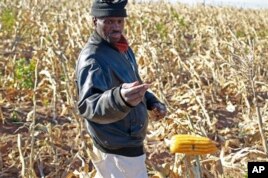20 October, 2014
A new study says the speed and severity of climate change could cause major damage to small African farms. These farmers are already struggling to deal with the effects of climate change.
The study was released at the African Green Revolution Forum in Addis Ababa last month. It is called the 2014 African Agriculture Status Report. David Sarfo Ameyaw was a lead producer of the report. He is a director at AGRA -- the Alliance for a Green Revolution in Africa.
"Small-scale farmers are the backbone of African agriculture. About 70 percent of the rural population in sub-Saharan Africa are small-scale farmers. They produce about 80 percent of the food need in Africa."
Small-scale farmers grow most of the staple crops in Africa on fields that are usually from two to 10 hectares. Small-scale farmers in Africa are much less productive than those in other continents. In African countries, farmers produce about 1.5 tons of cereal from each hectare. Farmers in many other countries produce more than 5 tons per hectare. Mr. Ameyaw says there are several reasons for this difference.
"About 90 percent of these farms are rain-fed, which means that they depend on the weather. Weather is rainfall. Weather is drought. Weather is [an] increase in temperature. They are [more] exposed to [these] climate effects than any other part of the world. On top of that most of them use their own labor or family labor. They are not mechanized."
The AGRA report says farmers in sub-Saharan Africa are also dealing with rising temperatures.
"It has been projected that within the next 35 years the increase in temperature will be between 1.5 to 2.5 degrees [Celsius]. This major rise in temperature bring(s) a lot of issues to Africa food security. It is going to affect reduction in yield -- which is already low – [and an] increase in vulnerability to pests and diseases that will kill most of the livestock."
Climate change is also expected to affect the average length of the growing season. This could continue to reduce the already-low amount of crops that come from each hectare.
Mr. Ameyaw says experts are urging African farmers to reduce the effects of climate change with a program called "climate-smart agriculture." The program includes ways to improve and care for soil.

A farmer picks his maize in a field near the house and birth place of former South African President Nelson Mandela in Qunu, South Africa, June 12, 2013.
"We are talkin(g) about farmers being able to adopt both organic and inorganic nutrient enriching technology to improve their soil fertility. Things that we promote are the right use of inorganic and organic fertilizer, soil tillage, the right use of cultivating the land. Putting things like legume(s) and cereals together to increase the soil nutrient content."
Experts are also urging small-scale farmers to grow new kinds of crops. Some crops do not need as much manufactured fertilizer. Others can grow well in times of high heat or a severe lack of water.
The AGRA official says scientists who create new kinds of crops are increasing both the productivity and nutritional value of crops. These scientists are called crop breeders.
"In AGRA, what we do is to be able to help African scientists. Currently, we have trained about 200 African crop breeders. We have been able to release over 400 Africa(n) varieties. About 80 percent of these varieties have been commercialized. When I say ‘commercialized' it means it has been multiplied by Africa seed companies."
The new kinds of crops include maize, sweet potato, sorghum, soya and cassava. Mr. Ameyaw notes that the new versions of these plants are not genetically modified.
"No, no, no, no, no. AGRA, as an organization, doesn't promote GMO. We are talking about conventional breeding to improve varieties that will be adopted by the farmers and that can be able to withstand the climate change that we are going through."
Mr. Ameyaw says there is a great possibility for agricultural growth in Africa led by small-scale farmers. But he says there is a great need to increase investment and expand climate-smart agriculture in sub-Saharan Africa. He estimates that would cost more than $1,600 for every small-scale farmer each year for 10 years. And he says he knows where that money will come from.
"Governments would invest about 50 percent. And (the) private sector will invest about 40 percent of this amount to transform African agriculture by 2020."
He says money is needed for research and development and for the training of scientists. He also says researchers must develop methods to reduce waste from the harvest using improved processing, storage, transportation and modern marketing.
I'm Caty Weaver.
VOA Correspondent Joe De Capua reported this story from Washington. Christopher Cruise wrote it for Learning English and produced the program. Caty Weaver was the editor.
_________________________________________________________
Words in This Story
severe – adj. not gentle; causing much pain, sadness or damage
staple – n. an important food that is eaten very often
crops – n. plants that are grown and gathered for food, such as grains, fruits and vegetables
nutrition – n. the process of eating the right kind of food so you can grow properly and be healthy
method – n. the way something is done
Now it's your turn to use these Words in This Story. In the comments section, write a sentence using one of these words and we will provide feedback on your use of vocabulary and grammar.